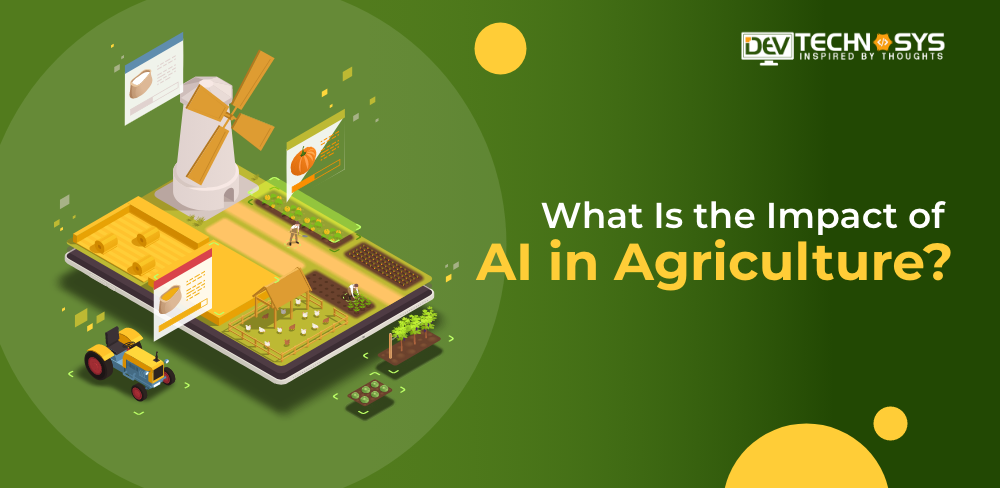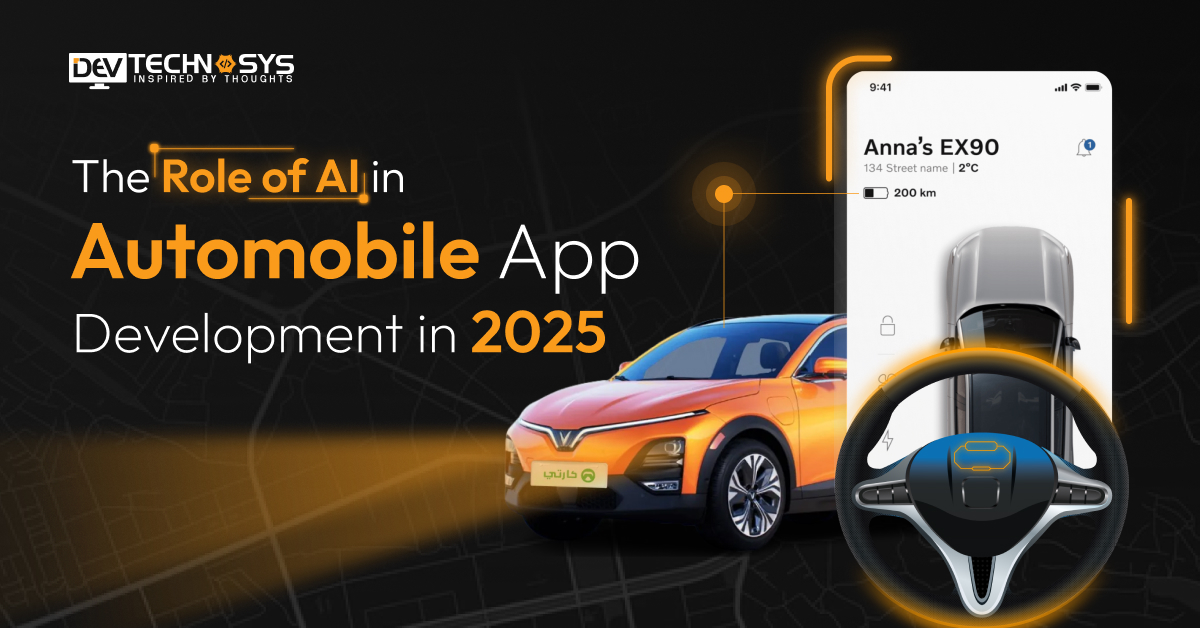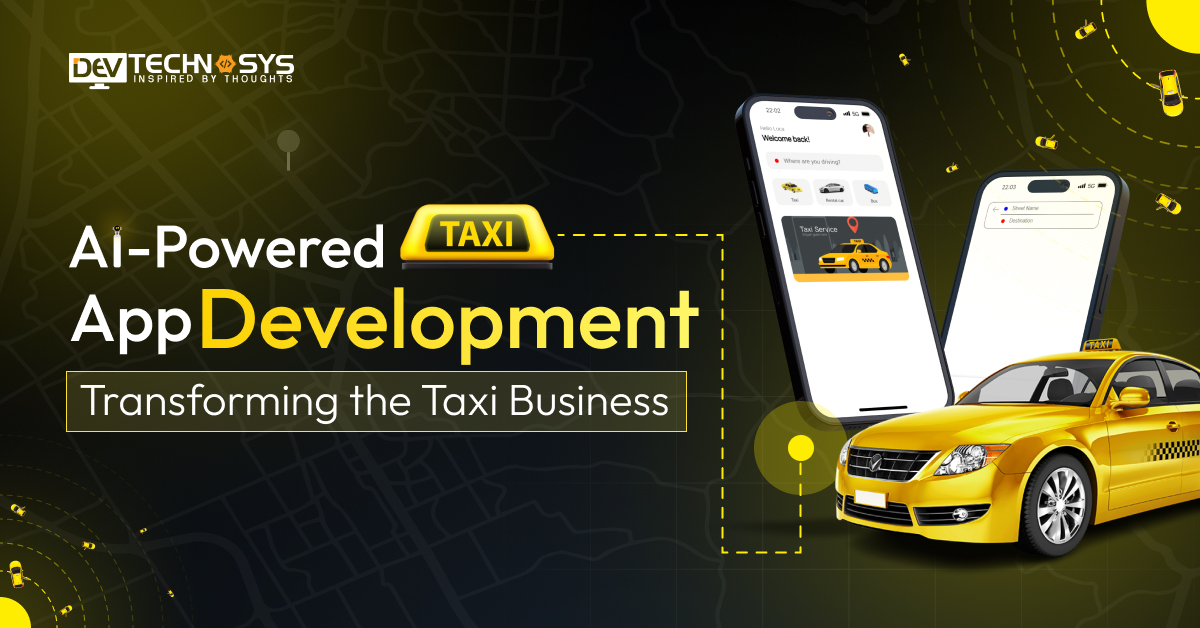Over the past few years, the traditional process of farming and agriculture has changed tremendously. All credit goes to the technological advancements due to which agriculture software development took place.
Not only this, but the experts have started implementing the modern-age tools and technologies to draft a reliable and efficient software. For instance, AI in agriculture is leaving a great impact on the software while helping businesses gain an upper edge in the market.
The Artificial Intelligence is supporting multiple sectors to boost business productivity and the AI development solutions are helping businesses overcome challenges faced by agricultural industries. Overall, AI is leaving a positive impact on the agriculture sector. It is helping all-scale businesses grow with time.
Want to know, how? Continue reading this blog…
Current Market Stats of AI in Agriculture
- As per B.I. Intelligence Research, global spending on advanced agricultural technology and systems, including A.I. and ML, is expected to reach $15.3 billion, and the revenue will increase 3x times by 2025.
- IoT-enabled Agricultural monitoring is the fastest-growing technology area in smart, connected agriculture, and PwC projects will reach $4.5 billion by 2025.
- According to Markets&Markets, spending on A.I. technologies and drone software development in Agriculture is expected to increase from $1 billion in 2020 to $4 billion in 2026, with a CAGR of 25.5%.
- Agricultural efficiency is raised, crop yields are improved, and food production costs are decreased. Thanks to A.I., ML, and IoT sensors that offer real-time data for algorithms.
- Experts say the world’s population will rise by 2 billion by 2050.
- According to the Economic Research Service of the Agriculture U.S. Department, cultivating, processing, and distributing food in the U.S. is worth $1.7 trillion.
- By 2050, an additional 2 billion people are expected to live on the planet, and A.I. & ML have already demonstrated their ability to fill that gap.
What Are the Benefits of AI in Agriculture?
Are you a farmer who cannot handle all the farming activities alone and want to switch to agriculture management software? You are alone! There are ample farmers who are in a similar situation. Here are the amazing benefits of AI in agriculture.
#1. Better Crop & Soil Monitoring
Before the introduction of Artificial Intelligence, farmers had to manually walk through their fields to keep an eye on the crop’s progress. But not anymore. Now, drones hover over farms and identify grain stalks harmed by viruses, pests, or other causes.
According to the data, such damage can result in losses of 10–28% wheat and 25–41% rice. But, while integrating AI in agriculture, farmers can intervene to salvage crops before it’s too late and turn all those lost resources into revenue-generating outcomes.
So, if you are also a farmer expecting to keep better monitoring of the soil and crop, it is advisable to seek agriculture software development services from experts. They will help you deliver a perfect app for the agriculture business.
#2. Hassle-Free Data Gathering
While drones are used to monitor crops from the air, there are advanced tools available that farmers can use to perform the same function in the fields and on the ground. Some robots ride through the farmland and keep an eye on all the ongoing farming activities, including stress response and the overall health of the plants.
While assisting the robot with its navigation, LiDAR can also collect vital data regarding the health of the plants. It enables the robot to gather details about the plants’ height and other important characteristics. Overall, the agriculture industry owners can remain to ensure data gathering with AI in agriculture.
#3. Smart Detection of Pests & Weeds
Detecting weeds and pests has become a major concern for today’s farmers, and this is an ongoing defy as herbicide conflict becomes routine. According to the experts’ estimation, around 250 types of weeds are defiant to herbicides. So, the implementation of AI in agriculture help farms find different component approaches and safeguard their farm from unwanted pests and weeds.
It will not only ensure better farming productivity but save costs to a great extent. Farmers simply need to spend the cost to develop agriculture software, and then they can reap benefits for years.
#4. Advanced Weather Forecast
It is one of the amazing applications of AI in agriculture that help farmers get advanced analytics of weather forecasts. It helps them to plan farming activities accordingly. All the data insights into upcoming weather conditions from the AI applications help farmers schedule agriculture and farming activities.
For instance, smart AI applications in agriculture will offer the best time for farmers to sow seeds based on the upcoming weather conditions.
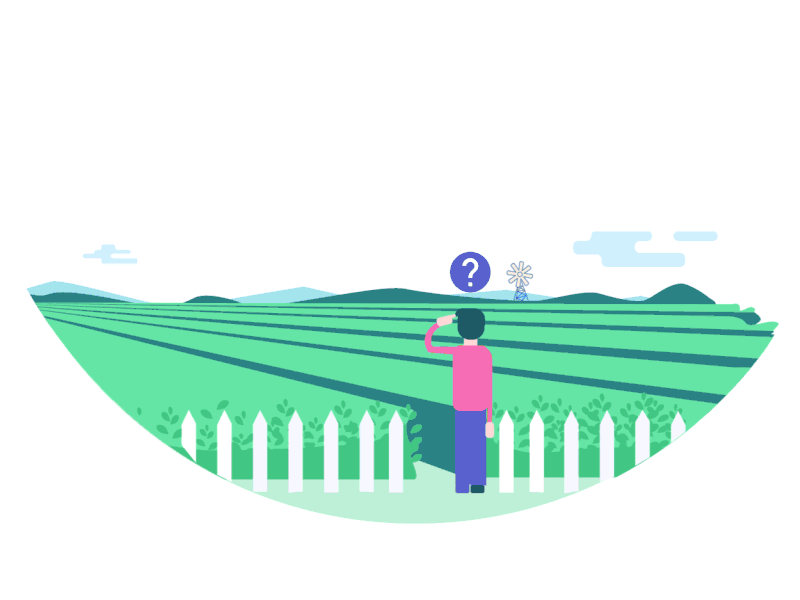
#5. Better Harvesting
Finally, the last major impact of AI in agriculture is improved harvesting. It helps the farmer to get the best suitable time for harvesting, which further benefits their business. Predicting the right time to harvest crop is difficult offline, and this is where the implementation of agriculture software development comes in handy.
Businesses can simply seek on-demand app development services from professionals and get a perfect application for their business.
Major Challenges Farmers Face While Adopting AI in Agriculture
Besides the benefits of Artificial Intelligence in the agriculture sector, there are major challenges too. Yes, you read it right! Do you want to know the difficulty farmers face while adopting AI in agriculture? Continue reading…
- Lack of Experience
We all know that farmers aren’t experienced enough and well-versed in using high-end tools and technologies. So, they might face difficulty while using the agriculture management software. Developed regions like the US, Europe, etc., will benefit from AI in agriculture, but businesses will face difficulty in areas where agricultural technology is not so common. The farmers will need the experts’ assistance in implementing and adopting the technology.
Hence, an agriculture software development company planning to launch unique software must consider an effective proactive approach to develop an agriculture application. Then, it will make the application perfect for all-scale farming industries.
- Time-Taking Adoption Process
Every farmer needs to know that AI is a more sophisticated version of older technology for analyzing, collecting, and monitoring field data. For AI to function, the appropriate technological infrastructure is required; hence, seeking expert assistance is mandatory. Because of this, even farms with some technology in place can struggle to advance.
Farmers should be introduced to technology gradually, starting with simpler tools like an agro trade platform. After farmers become accustomed to a simpler solution, it will be appropriate to advance and provide something else, such as AI functions. So, farmers must be patient enough to learn the agriculture adoption process, which is a little lengthier than traditional farming practices.
- Privacy & Security
Since there are no rules and regulations regarding the usage of AI in agriculture and other sectors, smart agriculture farming raises legal issues and concerns that often remain unanswered. Security threats like Cyberattacks and data leakage makes it difficult for framers to trust the software for their farming activities.
Unfortunately, a lot of farms are a victim of such threats and which is why, farmers always wanted a completely secure agricultural management software. So, here the professionals of agriculture software development services need to gain the trust of such farmers and help them offer a complete secure farming software.
Use Cases of AI in Agriculture
AI technology has a sizable impact on the agriculture sector. The following are the several use cases of AI in agriculture, including:
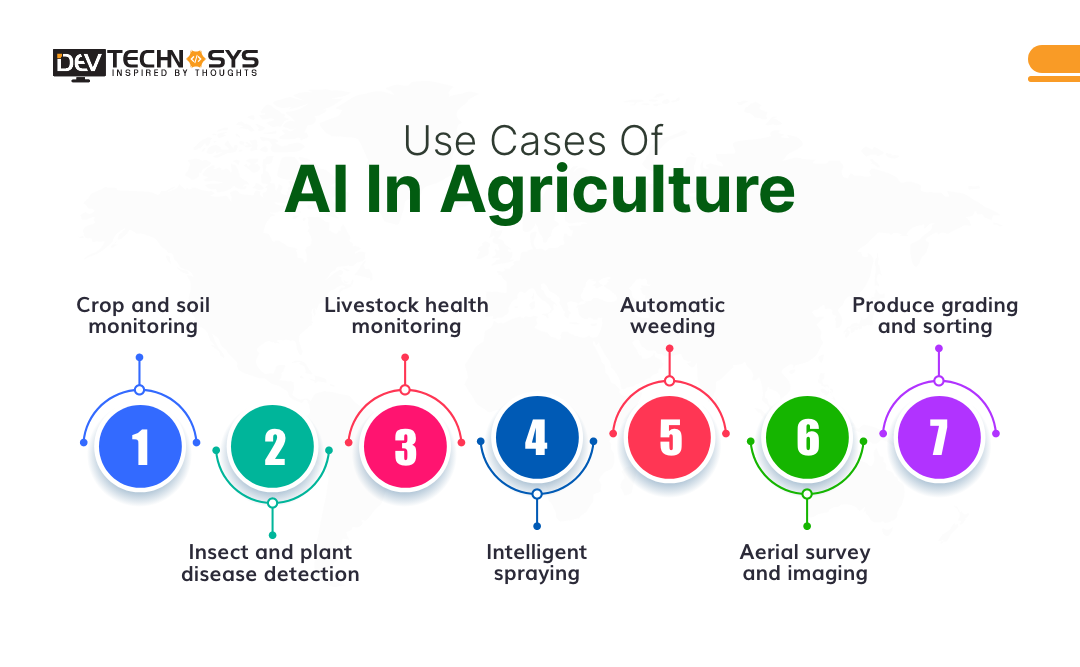
1. Precision Agriculture:
AI can be used to improve the precision of crop management practices, such as soil analysis, nutrient management, and irrigation.
2. Crop Monitoring and Prediction:
Algorithms used in Artificial Intelligence can analyze data from various sources to predict crop yields, track disease, and pest outbreaks, and identify areas in need of attention.
3. Livestock Management:
Monitor livestock health, behavior, and feeding patterns while integrating AI into healthcare. It enables farmers to make more informed decisions about their herd management.
4. Supply Chain Optimization:
Latest technologies like AI can help optimize the entire agriculture supply chain, from seed selection and planting to harvesting, transportation, and distribution.
5. Automated Farming:
AI-powered robots and drones can perform tasks such as planting, harvesting, and monitoring crops while reducing the need for manual labor and increasing efficiency. So, businesses can develop drone control app to enable automated farming.
The Future of AI in Agriculture
Technology has been employed in agriculture for a very long time to increase productivity. It also lessen the demanding manual labor needed for farming. Since the advent of agriculture software development, humankind and agriculture has evolved from better plows through irrigation and tractors to contemporary AI.
Computer vision’s expanding and accessible availability could represent a big advancement in this area. Given the significant changes in our climate, environment, and food needs worldwide, AI in mobile app development has the potential to improve 21st-century agriculture. So, farmers can go for the implementation of AI in agriculture and streamline their farming activities.
Conclusion!
Artificial Intelligence simulates thinking; it learns from data and solves problems. The development of smart farming has progressed to AI. However, other technologies are still necessary. Farmers require a technology infrastructure to avail profit from AI in agriculture. The development of that infrastructure will take some time, but farmers can create a strong technology ecosystem that will endure.
For the time being, agriculture software development company need to consider a few things. For instance – How to enhance their agriculture software, how to assist farmers in overcoming challenges, and more.
It will help to make the agriculture software development process more seamless and hassle-free. So, farmers, what are you waiting for? Get in touch with a leading company or hire dedicated IoT app developers who can create a perfect app for your farming industry.



